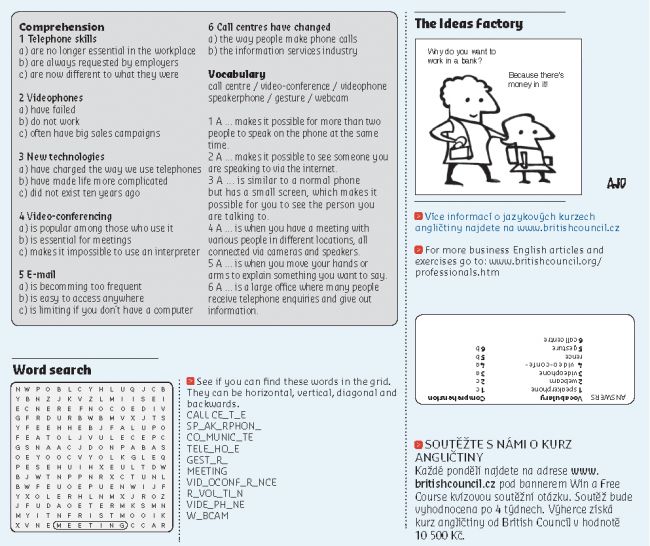Pre-reading task
1 How many communications devices do you use?
2 How have the devices you use for communication changed over the last 15 years?
3 Have you ever taken part in a video-conference?
Now, read the article and compare your experiences with those outlined in the article.
There was a time when 'telephone skills' were essential in the workplace. Many employers asked for telephone skills in their recruitment adverts. Training organisations and big companies offered courses in 'phone skills': how to answer, ask, reply and negotiate on the phone. Language schools offered courses in 'telephone English'.
Now, however, the skills necessary to communicate across long distances are different. The reason for this is the way telecommunications are changing.
From the speakerphone, to webcams, to text messages, internet forums and chat rooms, the growth of e-mail and the BlackBerry, traditional telephones are no longer a part of our lives in the way they were before. There is a range of methods of communication now available that simply did not exist ten or 15 years ago.
Videophones have not had the impact that many telecommunications companies wanted, but heavy promotion and marketing campaigns means that they are becoming more common.
Video-conferencing, however, has become a very popular way of organising international meetings. Now - thanks to webcams - colleagues from around the world can meet up almost as if they were in the same room. Most people who have used video-conferencing for business or academic purposes are very positive about it. Videoconferencing offers real-time communication, the ability to see other people's gestures and facial expressions (essential to help communication), while also having the ability to take a certain amount of time, and use an interpreter or a dictionary if necessary.
Now, e-mail is not just limited to our computers. We can read e-mails on mobile phones, or on gadgets like the BlackBerry. Computers themselves can now use programmes like Skype to make cheap, long-distance calls, and now it is much easier to carry a computer around because new laptops are so light.
It is now impossible to hide from our bosses.We can't say that we are in bed with a cold, when you're really lying on a beach somewhere.
However, working by phone, of course, is not finished. The call centre has been one of the work revolutions of recent years. Now that telecommunications are a much bigger part of our lives, big companies (banks, insurance companies, airlines, and so on) do not need to have expensive offices and branches in town and city centres. Everything can now be made possible via the phone or the web. Huge operations can now be carried out at a fraction of their previous cost. Call centres are also an area where outsourcing is highly significant. Now it is common to make a call from somewhere in Europe and end up speaking to a call centre operator in Bangalore or Hyderabad.
So, even though you may be glued to your Palm Pilot, those 'telephone skills' are still essential. And remember, when you are on the phone you can be comfortably seated in your own house, with your feet up on your desk. And as long as videophones don't become too common, you can still pull a face at your boss.
Chris RoseVíce informací o jazykových kurzech angličtiny najdete na www.britishcouncil.cz
For more business English articles and exercises go to: www.britishcouncil.org/professionals.htm
Soutěžte s námi o kurz angličtiny
Každé pondělí najdete na adrese www.britishcouncil.cz pod bannerem Win a Free Course kvízovou soutěžní otázku. Soutěž bude vyhodnocena po 4 týdnech. Výherce získá kurz angličtiny od British Council v hodnotě 10 500 Kč.
Comprehension
1 Telephone skills
a) are no longer essential in the workplace
b) are always requested by employers
c) are now different to what they were
2 Videophones
a) have failed
b) do not work
c) often have big sales campaigns
3 New technologies
a) have charged the way we use telephones
b) have made life more complicated
c) did not exist ten years ago
4 Video-conferencing
a) is popular among those who use it
b) is essential for meetings
c) makes it impossible to use an interpreter
5 E-mail
a) is becomming too frequent
b) is easy to access anywhere
c) is limiting if you don´t have a computer
6 Call centres have changed
a) the way people make phone calls
b) the information services industry
Vocabulary
call centre / video-conference / videophone speakerphone / gesture / webcam
1 A ... makes it possible for more than two people to speak on the phone at the same time.
2 A ... makes it possible to see someone you are speaking to via the internet.
3 A ... is similar to a normal phone but has a small screen, which makes it possible for you to see the person you are talking to.
4 A ... is when you have a meeting with various people in different locations, all connected via cameras and speakers.
5 A ... is when you move your hands or arms to explain something you want to say.
6 A ... is a large office where many people receive telephone enquiries and give out information.
 Přidejte si Hospodářské noviny
mezi své oblíbené tituly
na Google zprávách.
Přidejte si Hospodářské noviny
mezi své oblíbené tituly
na Google zprávách.
Tento článek máteje zdarma. Když si předplatíte HN, budete moci číst všechny naše články nejen na vašem aktuálním připojení. Vaše předplatné brzy skončí. Předplaťte si HN a můžete i nadále číst všechny naše články. Nyní první 2 měsíce jen za 40 Kč.
- Veškerý obsah HN.cz
- Možnost kdykoliv zrušit
- Odemykejte obsah pro přátele
- Ukládejte si články na později
- Všechny články v audioverzi + playlist





